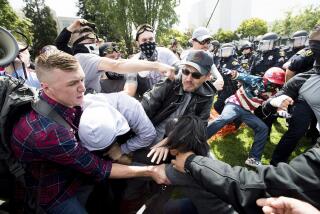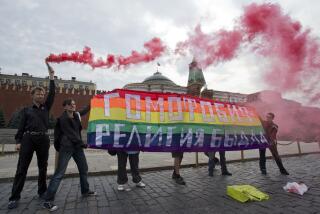Moscow Court Vindicates Jehovah’s Witnesses After Years of Persecution
- Share via
MOSCOW — Earlier generations of Yaroslav Sivulsky’s family were persecuted as Jehovah’s Witnesses in the Soviet Union, and then the state still sought to ban the group as a dangerous cult--even in democratic Russia.
Finally, in what was called an important victory for religious freedom in Russia, Sivulsky saw justice done Friday when a Moscow court threw out a case that sought to outlaw the group in the capital.
In 1998, an anti-cult group called the Committee to Save Our Youth pushed for action against the Jehovah’s Witnesses. Prosecutors in Moscow’s northern district launched the case in early 1999 based on Russia’s controversial 1997 law on religion, designed to limit the activities of foreign religious organizations.
For Sivulsky, the case was a flashback to the repressive Stalin regime 50 years ago when his parents, grandparents and thousands of other Jehovah’s Witness families were exiled to Siberia. His father got seven years in a labor camp, he said.
“The accusations were basically the same,” he said Friday. “The accusation was that their religion ran counter to the ideology of the Communist Party.”
Sivulsky, 33, was jailed for 18 months in 1987 for refusing to serve in the Soviet army. Believers do not accept blood transfusions, refuse to salute any national flag or do military service.
“In court [in 1987], I refused the services of a lawyer because the lawyer, the prosecution and the judge all played on the same team against me,” he said.
Prosecutors in 1999 took action to ban the Jehovah’s Witnesses under an article in the religion law aimed at cults, which can be outlawed for splitting families, inciting religious discord, encouraging suicide or denying medical care to the critically ill.
“Today’s decision sends a very important and optimistic message to other religions and confessions trying to practice in Russia,” said Sivulsky, who is spokesman for the Jehovah’s Witnesses in Russia.
“Russian society is not prepared to go back to totalitarian thinking,” he said. “It is impossible to prohibit freedom of religion, freedom of association and freedom to speak to people, which is basically what the prosecution was demanding.”
Human rights groups welcomed Friday’s decision but cautioned that harassment of many religious groups by bureaucrats and police remains common in Russia.
Advocates of religious freedom feared that a successful prosecution against the Jehovah’s Witnesses would have opened the gates to similar actions against many other religious groups struggling to operate in Russia.
The court called in five experts to examine the literature of the Jehovah’s Witnesses before the judge dismissed the prosecutor’s case for the ban.
“It’s a very important test case. It sets the standards for how much evidence you have to produce to ban a group like this,” said Diederik Lohman, director of the Moscow office of Human Rights Watch. “The fact that all the literature had to be examined by experts sets a precedent for the way cases like this are to be dealt with.”
The Jehovah’s Witnesses group was founded in the late 19th century in the U.S. and appeared in Russia several years later. It now claims to have 250,000 followers here.
Galina Krylova, a lawyer for the group, said the Moscow case was based on absurdities.
She cited a “stupid accusation that my clients don’t celebrate the [Russian] Orthodox Christmas--but Muslims or Jews don’t celebrate it either.”
Russian Orthodox Deacon Andrei Kurayev, professor of theology at St. Tikhon’s Institute and Moscow State University, insisted that it was clear that the Jehovah’s Witnesses are “a totalitarian sect” that must be resisted strongly by the Orthodox Church’s anti-missionary program.
“This sect tries to control people’s consciousness,” he charged. “They very strictly limit all the information that their followers get. Thus, they are a threat not only for the state but for individuals as well.”
But he said he feels that it is up to the Orthodox Church to struggle against such groups.
“We should work hard and struggle for people’s souls rather than wait for courts to ban them,” he said.
The Russian Orthodox Church, which bitterly opposes missionary activities, was one of the main proponents of the 1997 religion law, which forced many denominations to go through a difficult registration process. The only ones excused were those defined as “traditional” to Russia: Russian Orthodoxy, Judaism, Islam and Buddhism.
The Salvation Army’s registration was rejected by the city of Moscow in 1999, and it has been struggling since then to have the decision overturned.
*
Sergei L. Loiko of The Times’ Moscow Bureau contributed to this report.
More to Read
Sign up for Essential California
The most important California stories and recommendations in your inbox every morning.
You may occasionally receive promotional content from the Los Angeles Times.













